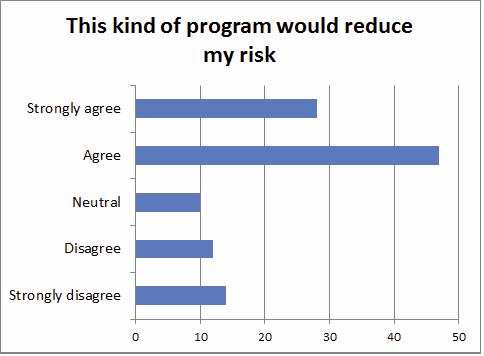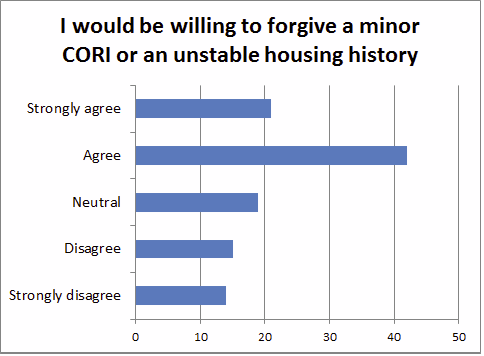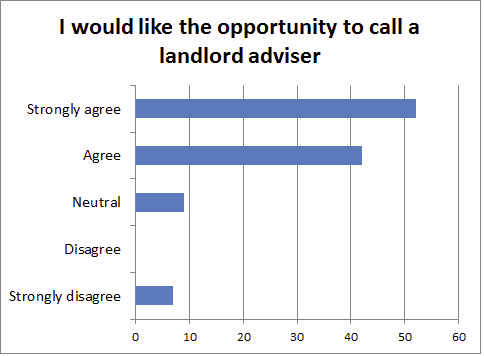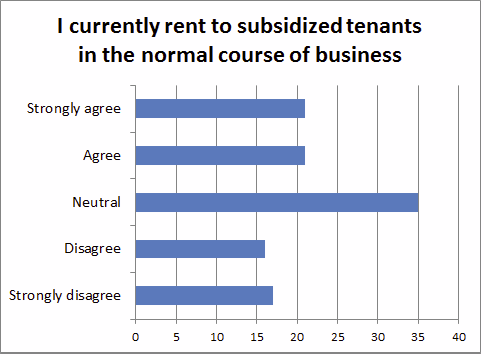Insurance Against Homelessness Early Survey Results
| . Posted in News, policy - 0 Comments
aka "the Landlord-Tenant Guarantee"
Although the name of the program isn't yet decided, the idea is clear: we can help the homeless get out of shelter and remain in stable housing. We wrote about this in last month's newsletter.
As many of you know, we have a seat on the Massachusetts Senate Special Commission on Housing. The homelessness subgroup has been meeting regularly and we intend to pilot a new program.
Under this program, any landlord who takes a homeless family out of shelter would receive the following guarantee:
- $5,000 insurance for any unpaid rent
- Equivalently large insurance in case of property damage, depending on region
- $750 insurance for attorney's fees in the event of an eviction
- Landlords could call a new state-funded landlord adviser for assistance should problems arise (e.g., noise and nuisance, unauthorized residents, property cleanliness, etc.)
This insurance program would stack with existing subsidies. For instance, HomeBASE, MRVP or Section 8 would still be used to help the tenant afford the apartment.
The intent of the insurance is to eliminate the appearance of risk for tenants who have unstable housing histories and/or minor CORI's. (Tenants with a history of serious crime would not be eligible for the program.) Landlords would retain the final say on whether a tenant qualifies for an apartment. There would be no change to the landlord's right to evict.
Do Landlords Like this Idea?
As of 10pm on September 29, we had received 114 survey responses. 
The majority of respondents feel that this program would be effective at reducing risk.
A vocal minority abhor the idea. Those who strongly disagreed said:
- The State of Massachusetts is so disgustingly pro-tenant that landlords have to take extraordinary precautions to protect ourselves against damage, psychotic tenants, threats and non-payment of rent.
- With the current imbalanced Tenant / Landlord climate we do not believe any state sponsored advisor would work in the best interest of the landlord.
- There will be a loop hole in there somewhere. My only guarantee is not to rent to them.
But the majority seem willing to open the door to a new era. Those who agreed said:
- Having a program that will reduce the risks to me in case of excess costs as mentioned above would make it much easier for me to want to rent to HomeBASE or subsidized families.
- The program you outline should have been a part of programs like "Home Base" from the start. This state forces landlords to support indigent people, and while I know and really care about the need, the laws are hideously unfair to landlords.
- I would be more inclined to include people that need assistance if there is assistance for landlords should there be problems.
- I think it's a wonderful way to help landlords fill vacancies and save the state money on emergency housing!
- As long as the landlord remains in control of the ultimate decision-making on whether to accept the tenant, then I totally agree with the program and would participate.
The next question addresses the issue of "housing barriers", aka, "disqualifications".
Overall there is less agreement on this point. But the majority would still be inclined to wave minor CORI's and unstable histories because of the caps on the guarantee, which are perceived to be high. These caps were a crucial item for us when negotiating the pilot program.
There does seem to be a regional difference: landlords in Boston tend to perceive the caps to be lower than landlords in Worcester. This makes sense. Because Boston rent levels are higher, the same cap buys fewer months' coverage.
The next question determines whether landlords are worried about behavioral challenges during the tenancy.
Strong agreement on this question shows that yes, landlords are worried. Landlord support is a critical aspect of the program. We must be sure to create a single central office with an experienced landlord-as-mediator answering the phone. We must do landlord support better than what the regional subsidy administrators currently provide.
The fourth and final question tries to determine if this program would encourage more landlords rent to subsidized tenants.
This is interesting. Those who answer "strongly agree" are what we can consider the "subsidy experts", who will always have a unit ready for a HomeBASE or Section 8 tenant. Overall survey respondents were split.
Of those who said they don't currently rent to subsidized tenants, 42% (14 respondents) said they would both participate in this program and forgive a CORI or unstable housing history. This is the most significant survey result. It shows that a guarantee program would effectively move the needle on subsidy participation.
Units Available
In the final section of the survey, we asked landlords to enter in number of units, city, and average rent for places they might open to this program.
So far we have identified 293 units with rents that seem affordable, doing a quick gut check. That's with only 114 respondents. For comparison's sake, there are 70,000 landlords in Massachusetts and only 4,500 homeless families in the Commonwealth today. Approximately 1,250 of them live in motels, which are the most expensive form of shelter. Clearly this program could have legs if released state-wide.
Conclusion
Overall, we must not miss our chance to pilot a Landlord-Tenant Guarantee or Insurance Against Homelessness program. The Commonwealth pays too much to give our homeless families shelter with no kitchen.
We believe that a Landlord-Tenant Guarantee would be a watershed program for Massachusetts for two reasons.
First, MassLandlords is at the table as it is being crafted. Landlords, tenant advocates, and the Commonwealth are working together for the first time! Some credit for this surely goes to Senator Chandler in the 1st Worcester District who brought us onto the Senate Commission in the first place. It also helped that our most active landlord volunteers, people like Sandra Katz in Worcester, have been pointing out the imbalance for many years.
Second, this program would be creating a state-funded landlord adviser. Unlike the regional subsidy administrators, the state-funded adviser would have the job of protecting the Commonwealth's financial interests in the guarantee. Meaning, they would help the landlord to move forward with legal or other measures needed to bring the tenant into compliance with the rental agreement. The experience with programs in other states is that fewer than 10% of cases result in a claim in the first two years.
With a guarantee like this, the Commonwealth would be helping landlords for the first time. And we would be doing more of what we do best, that most underappreciated of professions: providing shelter and a place to call home.
Tell your colleagues and friends about this survey. We will read every entry.




